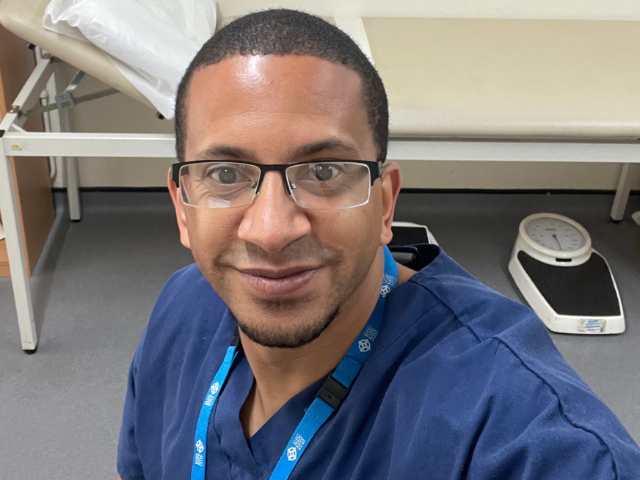
A foundation for stronger research
24 March
Getting input from the members of the public, especially from people living with the health issues being researched, is one of the most important ways to make research relevant and impactful.
Understanding recurrent UTIs
Dr Leigh Sanyaolu, a General Practitioner and Health and Care Research Wales / NIHR Doctoral Fellow at Cardiff University, is focused on improving the treatment of recurrent urinary tract infections (UTIs). His work aims to develop a decision aid to help patients and clinicians make informed choices about treatment options and to evaluate how various treatments affect outcomes such as antimicrobial resistance (AMR).
Recurrent UTIs (rUTIs) are a significant health issue, affecting about six percent of women in the UK. Dr Sanyaolu said:
“About half of women will get at least one UTI during their lifetime and our research suggests that about six percent of women have recurrent UTIs.”
For those dealing with recurrent UTIs, this can have a significantly negative effect on their life. Dr Sanyaolu said:
“The symptoms of recurrent UTIs can have a significant impact on all aspects of women’s lives but women also worry about further UTIs in the future.”
His research project, called IMPART: Improving Prophylactic Antibiotic Use for Recurrent Urinary Tract Infections, runs from 2021 to 2025. As part of this research, he is using several sources including interviews with women with recurrent UTIs and healthcare professionals, published trials and analysing anonymised data from the SAIL Databank. His research aims to address gaps in knowledge about recurrent UTIs and improve shared decision-making between women who experience them and healthcare professionals about preventing them.
Listening to those with lived experiences to improve study design and materials
His study started by reaching out to those who live with recurrent UTIs and hearing directly from them. Crucial input on his funding application came from public involvement members who have lived experiences with rUTIs. He knew members of the public would help shape his research idea, making sure it focuses on real-life issues, and they would review documents to ensure they were clear and user-friendly. Leigh also continues to meet with the members online to discuss how findings can be shared in practical, accessible ways.
Leigh consulted directly with women affected by rUTIs to understand their treatment needs and concerns and lets it guide his research to this day. The women advised Leigh on which areas were the most important to patients, they assisted with the interpretation of experiences of other women who have rUTIs and even helped design, test and refine the future interview structure as well as the recruitment participation sheet. Dr Sanyaolu said:
Working with patients added real value to my research and ensured the patient perspective was considered throughout.
“I have really enjoyed working with them, learned a lot from them about the impact of rUTIs and inspired me to try and make a difference in the management of this dreadful condition.”
The members of the public didn't just help with reviewing documents but also helped inform the design of the study logo and website and are now helping Leigh refine the prototype decision aid based on the collected results.
A public member’s perspective of helping shape this research
Susannah Fraser, 56, got involved in Leigh’s public involvement group through the national charity Bladder Health UK where she provides advice to people based on her experience. Having dealt with bladder issues for much of her adult life, Susannah brings valuable lived experience to the study. Susannah said:
“I wanted to help because I live with this. I'm passionate about being able to share information and life experience to help other sufferers.”
She is a big advocate for using natural remedies to relieve pain instead of relying on antibiotics all the time and shares what she learnt with the involvement group.
“We get together on a Zoom call with other women from the group. Leigh usually shares the information that he wants to discuss beforehand. Then we provide feedback based on our notes and suggest changes which Leigh incorporates into his research.
“Leigh is so passionate about making a difference to the lives of people living with rUTIs. He saw the frustration women faced and realised research was the key to finding better answers.”
Making sure research reflects affected people’s priorities
After securing his Fellowship, Leigh has continued to collaborate with the same public contributors. Those women have become partners in the research, helping him understand evolving patient perspectives and refine his research approach as new questions or challenges arise as the study is conducted.
The collaboration with members of the public will help ensure the decision aid addresses all of the treatments available, including the potential benefits of non-antibiotic therapies. This aspect of the study is especially relevant given growing concerns about antibiotic resistance, making it not only a personal but also a public health priority. By making this decision aid widely available Dr Sanyaolu hopes to enhance patient care and empower women facing rUTIs with accessible, evidence-based treatment options.
Embedding public involvement in research from the start
Health and Care Research Wales provides a platform for researchers like Leigh to connect with members of the public and bring their expertise together. Public involvement should be embedded throughout your entire research process, right from the beginning – starting with writing research proposals. This way ensures people’s voices are heard and the research truly reflects the needs and perspectives of those it aims to benefit. To learn more about how we can support your research with public involvement contact the Communications, Engagement and Involvement team.